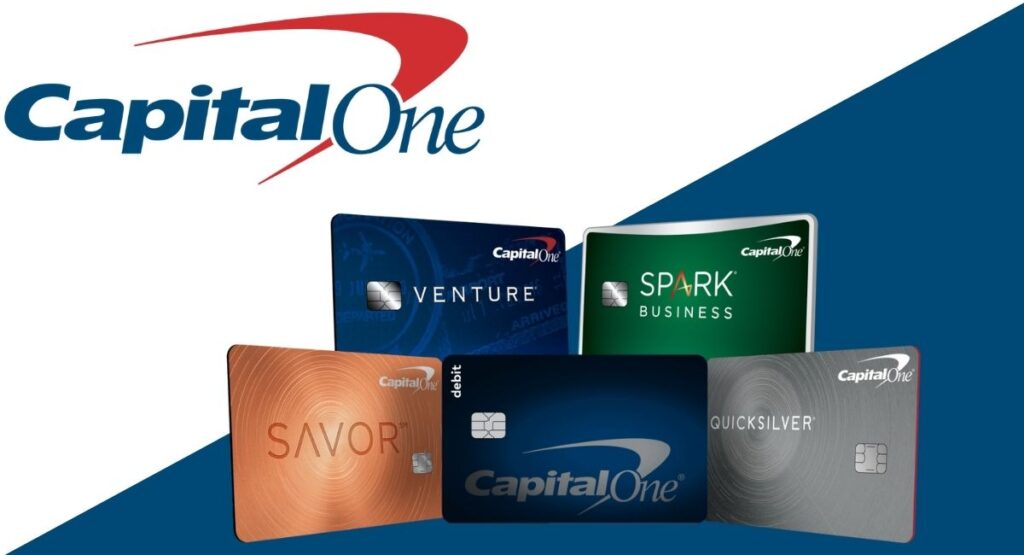Capital One offers a range of credit cards with various benefits, from cash back rewards to travel perks. Their cards are known for user-friendly features like no foreign transaction fees and helpful mobile apps.
With a strong emphasis on digital banking, Capital One has made managing your credit card account easy and convenient.
What is capital one?
Capital One is a financial services company based in the United States. It is one of the largest banks in the country, known for its credit card products, banking services, and other financial products.
Capital One offers a wide range of credit cards, savings accounts, checking accounts, personal loans, and other financial services to individuals, businesses, and commercial clients.
The company is headquartered in McLean, Virginia, and has a significant presence in the banking and credit card industries.

| Best For | Card Name | Features |
|---|---|---|
| Best No-Annual-Fee Card | Capital One Quicksilver Cash Rewards | Earn unlimited 1.5% cash back on all purchases. No annual fee. |
| Best Travel Card | Capital One Venture Rewards Credit | Earn miles on every purchase and enjoy travel perks. |
| Best Luxury Card | Capital One Venture X Rewards Credit | Premium travel rewards, airport lounge access, and more. |
| Best Cash-Back Card | Capital One Savor Cash Rewards Credit Card | Earn cash back on dining, entertainment, and grocery purchases. |
| Best Student Card | Capital One SavorOne Student Cash | Designed for students, earn cash back on everyday expenses. |
| Best Card for Bad Credit | Capital One Platinum Secured Credit | A secured card to help rebuild credit. Requires a security deposit. |
| Best Business Card | Capital One Spark Cash Plus | Ideal for businesses, earn cash back on all your business spending. |
Choosing the right Capital One credit card requires a thoughtful approach. Start by defining your purpose for the card—whether it’s rewards, cash back, travel perks, or credit building. Next, assess your credit score to determine your eligibility for different cards. Consider your spending habits and preferred categories for earning rewards.
Think about whether you’re comfortable with an annual fee or prefer a no-annual-fee option. Pay attention to interest rates, especially if you anticipate carrying a balance. Evaluate the rewards, benefits, and redemption options of each card.
Be mindful of any additional fees and read the terms and conditions thoroughly. Consider credit limits and credit line increase opportunities. Look into customer service quality and the mobile app’s user-friendliness.
Check for any special offers or limited-time promotions that can add extra value. Use online comparison tools to make an informed decision and apply online. Upon approval, review the welcome package to fully understand your card’s details.
Ultimately, the ideal Capital One credit card depends on your unique financial situation and preferences.
- Credit Score: Capital One offers credit cards for a range of credit scores, from poor to excellent. The specific credit score required will depend on the card. For example, cards with more attractive rewards and features generally require a higher credit score.
- Age: You typically need to be at least 18 years old to apply for a credit card. Some cards may have a higher minimum age requirement.
- Income: You will need to have a source of income to demonstrate your ability to repay any charges you make on the card. The income requirement may vary based on the card’s features and credit limit.
- Legal U.S. Residency: Most Capital One credit cards are available to U.S. residents. However, the specific residency requirements may differ by card.
- Credit History: For some cards, a positive credit history with no recent bankruptcies or serious delinquencies is required. Capital One also offers credit-building cards for those looking to establish or rebuild credit.
- Debt-to-Income Ratio: Capital One may consider your debt-to-income ratio when evaluating your application. It’s generally advisable to keep this ratio within a reasonable range.
- Existing Capital One Accounts: If you have an existing Capital One account, it can affect your eligibility for new cards. Capital One may limit the number of credit cards you can have with them.
- Application Frequency: Some Capital One cards have limitations on how often you can apply for them. For instance, you may need to wait a certain number of months between applications.
- Other Credit Cards: Capital One, like most credit card issuers, may consider how many new credit cards you’ve opened recently when evaluating your application. Frequent applications for multiple cards can sometimes negatively impact approval odds.
- Other Factors: Capital One will also consider other factors such as your employment status, housing situation, and outstanding debts.
- Personal Information:
- Full legal name
- Date of birth
- Social Security number or Individual Taxpayer Identification Number (ITIN)
- Contact information, including address, phone number, and email
- Income Information:
- Details about your employment, including your job title and employer’s name
- Annual income, which helps determine your ability to repay the credit card charges
- Housing Information:
- Information about your housing situation, whether you rent or own
- Credit Information:
- If you already have a credit card, you may need to provide details about your existing credit accounts, including the issuer, credit limit, and outstanding balance
- Identification Documents:
- Proof of identity, such as a driver’s license, passport, or other government-issued photo ID
- Social Security Card or ITIN:
- You’ll need your Social Security card or ITIN to verify your identity and comply with U.S. tax regulations.
- Other Financial Information:
- Details about your bank accounts, including account numbers and bank name
- Information about other sources of income, such as investments, rental income, or retirement income
- Proof of Address:
- A utility bill or other official document that shows your residential address as proof of residence
- Tax Returns (for some cards):
- For certain premium or business credit cards, you may be asked to provide recent tax returns to verify your income.
Whether a Capital One credit card is good for you depends on your individual financial needs and circumstances. Capital One offers a variety of credit cards with different features, so let’s examine some reasons why a Capital One credit card might be a good choice and how to determine if it’s a good fit for you:
Reasons a Capital One Credit Card Might Be Good:
- Capital One provides a wide range of credit cards, catering to different credit scores and financial needs. This diversity allows you to find a card that aligns with your specific requirements, whether you’re looking for rewards, cash back, travel perks, or credit-building options.
- Many Capital One cards do not have an annual fee, making them an affordable choice. This can be particularly advantageous if you’re looking to keep costs low.
- Capital One offers credit-building cards, including secured cards, which can help individuals with limited or poor credit history improve their credit scores.
- Capital One credit cards often come with flexible redemption options. You can typically redeem rewards for cash back, travel, gift cards, or merchandise, allowing you to choose what suits you best.
- Capital One offers a user-friendly mobile app and online account management tools, making it easy to track your spending, pay bills, and manage your account on the go.
- Many Capital One cards are known for not charging foreign transaction fees, making them a good choice for international travelers.
How to Determine If a Capital One Credit Card Is Right for You:
- Determine your primary purpose for getting a credit card. Are you looking for rewards, a cash back option, travel perks, or a way to build credit?
- Know your current credit score, as it will influence the type of Capital One card you’re eligible for. Capital One offers cards for a wide credit score range.
- Consider your typical spending categories and which card features align with your expenses.
- Decide whether you prefer a card with no annual fee or if you’re willing to pay an annual fee for additional benefits.
- If you expect to carry a balance occasionally, check the card’s interest rates (APR) to minimize finance charges.
- Look for reviews and feedback from existing cardholders to understand their experiences with specific Capital One cards.
- Use online comparison tools to compare different Capital One cards side by side. Look at features, fees, and rewards to make an informed choice.
- Once you’ve identified the best card for your needs, visit the Capital One website and complete the online application.
Pros
Cons
- Capital One offers a wide range of credit cards, catering to various financial needs, including cash back, travel rewards, and credit-building options.
- Many Capital One cards are known for not charging foreign transaction fees, making them a good choice for international travelers.
- Capital One provides a user-friendly mobile app and online account management tools, making it easy to track your spending, pay bills, and redeem rewards.
- Cardholders can often redeem rewards for a variety of options, including cash back, travel, gift cards, and more.
- Capital One offers several no-annual-fee credit cards, allowing you to benefit from their services without incurring yearly charges.
- Capital One provides options for individuals with limited or poor credit histories, such as secured credit cards, to help them build or rebuild credit.
- Many Capital One credit cards come with variable interest rates, which can change over time, potentially leading to higher finance charges.
- While Capital One allows for transferring miles to travel partners, it has a more limited network compared to some other travel reward programs.
- Some of their more premium cards may have high credit score requirements, limiting access for those with lower credit scores.
- Cash advances through Capital One credit cards can come with steep fees and higher interest rates, making them an expensive way to access cash.
- While Capital One cards generally have no foreign transaction fees, they might not be as widely accepted in certain regions compared to cards from other major issuers.
- While some cards have no annual fees, others come with annual charges, particularly premium cards. It’s important to consider whether the rewards justify the fee.
Before applying, it’s a good idea to review your credit report and credit score. Some Capital One cards are designed for specific credit ranges, so knowing your credit status can help you choose the right card.
Visit the Capital One website to explore the various credit card options available and choose the one that best fits your needs and credit profile.
- Go to the Capital One website (www.capitalone.com) to access the credit card application.
- Choose the specific Capital One credit card you wish to apply for based on your preferences and eligibility.
- Fill out the online application form with your personal information, including your name, contact details, Social Security number (or ITIN), employment details, income, and housing situation.
- Carefully read the terms and conditions associated with the card, including interest rates, fees, and rewards. Ensure that you understand and accept these terms before proceeding.
- After completing the application form and agreeing to the terms and conditions, submit your application.
You may receive an immediate decision or be directed to a page indicating that Capital One will review your application.
The approval process can take some time, so be patient. You can check your application status on the Capital One website or by calling Capital One’s application status phone line.
If your application is approved, you will receive your Capital One credit card by mail within a few weeks. Upon receiving your card, review the terms and conditions again and activate the card as instructed.
If your application is denied, you will receive a letter from Capital One explaining the reasons for the denial. You can contact Capital One’s reconsideration department for clarification or take steps to address the issues that led to the denial, such as improving your credit score.
Is Capital One a good credit card?
Capital One offers a variety of credit cards, and whether they are good for you depends on your specific financial needs. They provide options for different credit scores and offer features like rewards, cash back, travel perks, and credit-building cards. The suitability of a Capital One credit card varies by individual preferences and circumstances.
What is a Capital One credit card?
A Capital One credit card is a financial product issued by Capital One Financial Corporation. It allows cardholders to make purchases on credit, earn rewards or cash back, and access various cardholder benefits. Capital One offers a range of credit cards with different features and benefits.
Who issues Capital One credit cards?
Capital One Financial Corporation issues Capital One credit cards. It is a bank holding company and a major credit card issuer in the United States.
Is Capital One a bank?
Yes, Capital One is a bank. It is a diversified financial services company with a banking division that provides a wide range of financial products and services, including credit cards, banking accounts, loans, and more.
Is money safe in Capital One?
Capital One is a well-established financial institution, and deposits held in Capital One bank accounts are typically insured by the Federal Deposit Insurance Corporation (FDIC) up to certain limits. This insurance helps protect depositors’ funds in the event of bank failure.
What are Capital One benefits?
Capital One benefits can vary by credit card. Common benefits may include rewards, cash back, travel perks, purchase protection, extended warranties, and access to Capital One’s mobile app for convenient account management. Specific benefits depend on the card you choose.
Is a Capital One credit card a Visa?
Capital One issues credit cards on various payment networks, including Visa, Mastercard, and others. The specific network associated with your Capital One credit card depends on the card type and the partnership Capital One has for that card.
Why is Capital One the best bank?
Whether Capital One is the best bank for you depends on your financial needs and preferences. It’s important to consider factors such as account features, customer service, fees, interest rates, and available services to determine if Capital One aligns with your banking requirements. Capital One’s reputation and offerings make it a preferred choice for many individuals and businesses.

Hey, I’m Ratiranjan Singha, the Creator of Myworldstuffs.com. I Offer in-Depth Articles and Guides that Help you to Understand Various Financial Concepts.








